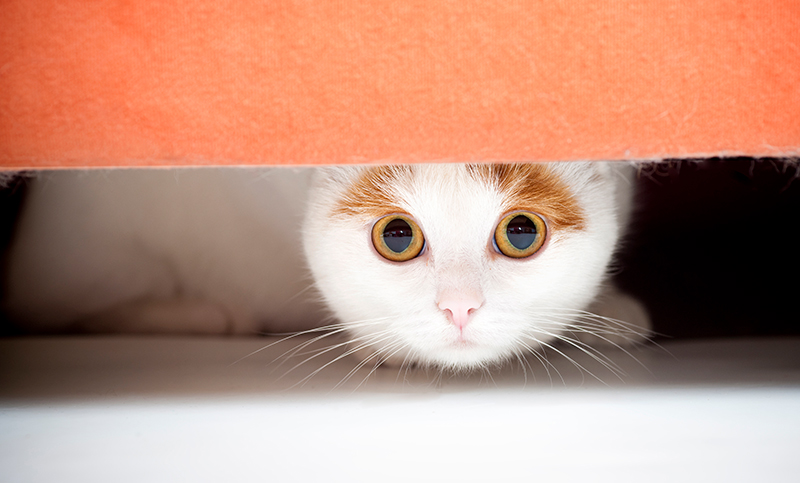Did you know that summer storms can become more fierce as a result of changing weather patterns? Whether those storms are simply extra strong thunderstorms, or more dangerous tornadoes and hurricanes, it’s important to prepare to help your cat get through the rough weather as safely and as calmly as possible.
Dr. Jason Nicholas, better known as Dr. J, is the Chief Medical Officer at Preventive Vet. He shared with us some ways to help your cat stay calm during scary summer storms. First, make sure that you’re prepared for the big emergency-type storms. We have a post about 7 Ways to Protect Your Pets in an Emergency that is a great place to start. In addition, Dr. J has both a free Emergency and Disaster Prep eBook and advice on assembling an emergency kit. Also, make sure if you live in a hurricane or tornado area that you know where you and your cat can safely shelter if a major storm comes your way. Always remember that if it’s not safe for you, it’s not safe for your pet.
Another way people can prepare for possible disasters is to work with any pets who might be scared of loud noises. This is helpful both for hurricanes and tornadoes, as well as the less dangerous but still scary summer storms that can whip up fierce winds and knock down branches. After all, more severe thunderstorms mean more loud claps of thunder! Other disaster situations can also involve lots of hustle, bustle, and noise. As a bonus, working with your cat to overcome loud noises will help your cat stay calm on Independence Day or other holidays when people are launching loud fireworks.
“There are training methods to desensitize and counter condition pets to such noises and events, as well as certain supplements and medications that can help,” said Dr. J before cautioning “one thing they shouldn’t do is rely solely on a medication called acepromazine, commonly called Ace.” Ace, he writes in an article, has its place in veterinary medicine but should never be the single therapy to help pets through fearful or anxiety-inducing experiences. He even refers to it as a “chemical straitjacket” since it’s merely a strong tranquilizer that prevents the pet from displaying any outward signs of fear. He notes, “Ace can actually increase a pet’s sensitivity to noises!” Obviously, this is not a great tool when preparing for the possibility of more frequent and more severe storms that will likely have loud wind and thunder. “People really should talk with their vet, or even a board-certified veterinary behaviorist, to help with this condition,” Dr. J advised.
When it’s muggy before a storm, it can feel extra hot outside, and even in our homes. Dr. J notes on his website that cats are good at “finding cool places where they can better regulate their body temperature.” However, there are still things you can do to help your cat feel their best despite the heat. Halo believes that it is important to feed your cat with whole food ingredients, and no “meat meal” of any kind. Additionally, although the rain might fall with force outside during summer storms, it’s important to keep your cat hydrated. We recommend adding wet food in summer months. Of course, also make sure that they have access to fresh, clean water for drinking. Dr. J. writes that if your cat eats wet food, it’s possible for them to consume half of their daily needed water from the wet food alone!
Our cats do so much for us, it’s important that we do our best for them. Feed your cat nutritious Halo food, prepare for disasters, and help them cope with loud noises that come during scary storms—that bond will be strong, healthy, and thriving. Doesn’t that sound purr-fect?

